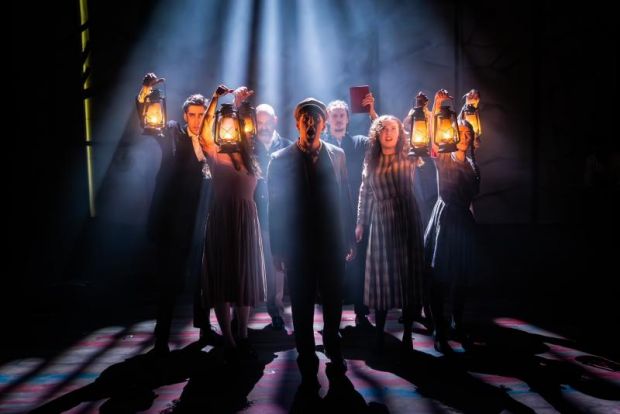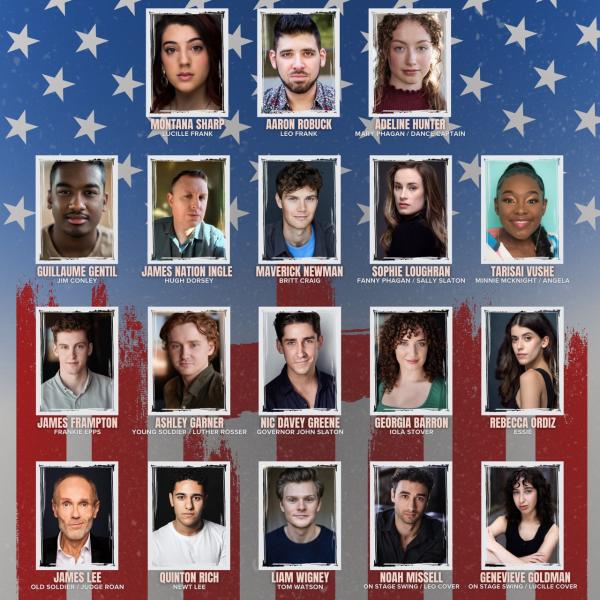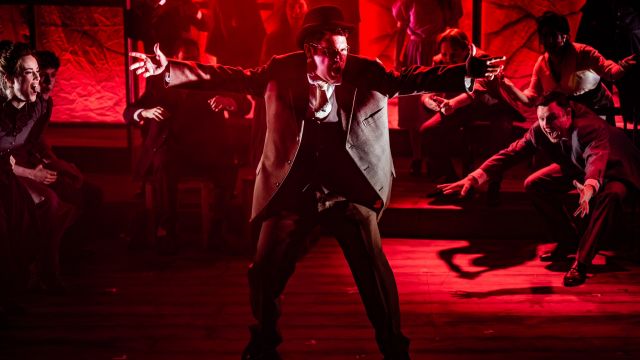An Authentic Parade
The Tony Award winning musical Parade opens in Sydney in May after a successful season in Melbourne. Based on a notorious miscarriage of justice, the production raises issues of both racism and authentic casting in theatre. David Spicer spoke to the actor in the lead role, Aaron Robuck.
In 1913, Leo Frank, the manager of the national pencil company in Atlanta, Georgia, was put on trial for the murder and rape of thirteen-year-old factory worker, Mary Phagan.
The Brooklyn-raised Jew was up against public opinion, a sensationalist publisher, and the false testimony of a janitor, who historians believe was the guilty party.
The court case and Leo’s ultimate fate fuelled the development of the anti-racism movement - the Anti-Defamation League on one side, and the Ku Klux Klan at the other end of the political spectrum.
In the central role of Leo in the Sound Works Production at the Seymour Centre is Aaron Robuck, reprising the part which he took on last year at Chapel off Chapel.
“There's something very interesting about this show that I think sets it apart, which is the relationship between the story and the audience,” said Aaron.
“The whole point of the show is to challenge the audience. It's not just entertainment; there's no way to not consider, what do you feel about your life, while watching this.”
The musical, with a book by Alfred Uhry with music and lyrics by Jason Robert Brown, won the Tony Awards for best book and musical score in 1999.
“There were moments in Melbourne, when a song finished, and half the audience didn’t know whether they're allowed to clap. Not in terms of whether the performance deserved applause, but about whether they felt good about supporting certain people and what they were doing.”
So, does the audience feel awkward about acknowledging a performance of a song performed by a character who is repugnant?
“Yes, and at the end of Act One the audience is basically considered to be the jury in the trial. There's a sense of they're responsible, and they're being watched.”

Whilst Leo Frank is a famous victim of prejudice, Aaron sees him as a flawed person who did himself no favours.
“He does put a target on his back because he's so unwelcoming to everyone, saying (at one stage) that the people in the community belong in zoos, because they're so uncivilized. He is an irritable person, and that's no doubt noticed by people.”
Frank’s personality problems gave the false accusations more credibility.
Aaron says the message from the musical, at the end of Act Two, is that history can repeat itself.
“That is where that kind of 2024 moment lands. We haven’t re-written the ending, but it is clear to the audience that we’re thinking about (contemporary antisemitism).
“It is set in the early 1900s, well before the creation of the State of Israel. So, I think when it comes to the actual events in the Middle East, there is not a relevance. But in terms of (how that conflict) is affecting Jews around the world, and the relationship between Jews and non-Jews, that's something that will resonate.”
Aaron is a big believer in having representation of actors in productions with the lived experience of the characters.
“There are three roles for people of colour, which are cast authentically, and myself and the actress who plays my wife Lucille – Montana Sharp - are both Jewish actors.
“In Melbourne, we had a great outing as a cast to both a Synagogue on Friday night for a service and then we also went to Christian service, as there is a memorial hymn in the musical.”
Jewish roles are regularly given to actors from a non-Jewish background.
 Image: Parade Sydney cast.
Image: Parade Sydney cast.
A recent article in the Times of Israel pointing out that “while casting directors are becoming more and more careful not to miscast minority roles — relating not just to race but disability, sexual orientation and more — Jewish characters are still regularly, if not predominantly, played by non-Jews. And that it has virtually always been this way.”
Bradley Cooper attracted controversy by wearing an embellishing prosthetic nose in his portrayal of Leonard Bernstein in Maestro. Helen Mirren played Golda Meir. In The Marvellous Mrs Maisel, a Jewish comedian was played by Rachel Brosnahan, who had attended “hundreds” of bar-mitzvahs etc., but was a non-Jew.
Closer to home the lead character in the musical Rent is Jewish but the most recent national tour cast a non-Jew in the role, attracting criticism from Jewish actors.
One of Aaron’s jobs is as a cantorial singer at Sydney’s North Shore Emanuel Synagogue.
Aaron draws some parallels between his life emigrating from the United States to Australia from a religious minority with Leo moving from New York to the deep south. His character spends a lot of time in prison awaiting trial, and he brings authenticity to the role by singing a Jewish prayer and adds Jewish harmonies to the music.
“These are things a non-Jewish actor would not know about. In general, there are certain stories that you can't learn. You can't learn the character without sort of knowing that part of them.
“I just go to the text if the actual script is speaking about certain experiences, and especially if it's marginalizing them in certain ways; I think that it requires someone to be in the room in that role owning that experience.”
SEASON DETAILS
Venue: Everest Theatre, Seymour Centre, Cnr City Road &, Cleveland St, Chippendale
Season: 9 – 25 May
Times: Mon 7.00pm, Wed-Sat 7.00pm, Sat 2pm, Sun 5pm (No show on Friday 17 May)
Price: From $99 Adult, From $69 Concession, $89 Early Bird, From $79 Preview
Bookings: seymourcentre.com or (02) 7255 1561
Production images: Aaron Robuck and the ensemble of Parade. Melbourne production. Phtographer: Matthew Chen
Subscribe to our E-Newsletter, buy our latest print edition or find a Performing Arts book at Book Nook.

